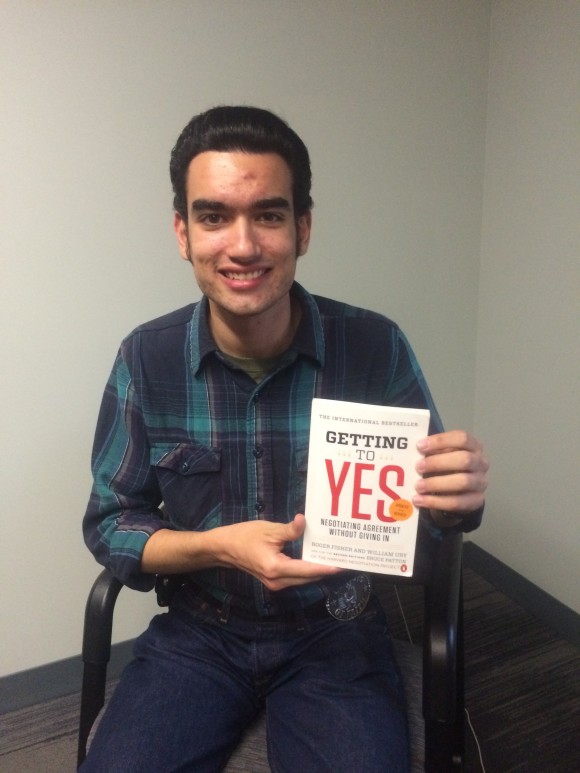A Powerful Approach to Learning about Conflict and Negotiation
March 16, 2016

Mark Wimberley finds real world role plays very practical. Here he holds the well-known negotiation book, Getting to Yes, used in the course.
Com 440: Conflict, Negotiation and Power is a Communication Studies course designed to enhance student learning through hands-on experiences in the classroom. As part of the curriculum, students participate in live negotiations with their peers. Instructor Kara Udziela provides each student with a set of instructions detailing specific guidelines to be followed. Often, certain parties have secret instructions on what to do or how to act during a negotiation.
Buying a Car
An early negotiation revolved around a buyer and seller of a used car. In order to set up this negotiation, the students were divided into buyers and sellers on either side of the room. Pairs were formed and each student took a few minutes to establish his or her strategy. Once the negotiation began, two of the students got right to bargaining when they sat down together. It was clear each student was committed to gaining what his or her directions specified.
One of the students, Mark Wimberley (pictured left), went into the negotiation with his plan in place. He wanted to win the negotiation by buying the car for the lowest price while his counterpart in the negotiation was trying to sell the car for a price that would yield the most profit.
Wimberley was confident in his approach. “I felt like my best option was to keep cool when she persisted with high prices. I tried my hardest to act like the car was no big deal to me even though we both knew I wanted it badly.” As the negotiation progressed, both parties managed to settle on an amount which ended up benefiting Wimberley the most, giving him the win.
Learning About Ourselves, Others and Conflict Styles
“Using models from MIT and Harvard, we learn distributive and integrative conflict styles and tactics, and students take industry-standard self-assessments at the beginning of the course to determine what their dominant negotiation styles are,” said instructor Kara Udziela. “As students encounter ever more complex, multi-party negotiation issues, as well as different and sometimes difficult people, my goal is that they gain confidence and skill in negotiating in a principled manner.”
This negotiation is one of many that will take place during the course in an effort to provide students with an opportunity to develop their negotiation skills throughout the semester. Students journal their experiences and reactions to peer styles. In group settings, they study hypothetical or real-world cases and brainstorm possible solutions and approaches to sensitive issues. Terms like BATNA, “expanding the pie,” “reservation point,” “hard on the problem, soft on the people,” become part of the classroom lingo.
Wimberley commented on the nature of the class, “I think that this is one of the most practical classes I’ve taken in my college career, because there will always be conflict in life, and there will always be undesirable situations that have potential to be avoided through skilled negotiation. Professor Udziela sets it up brilliantly by making us negotiate with each other.”

